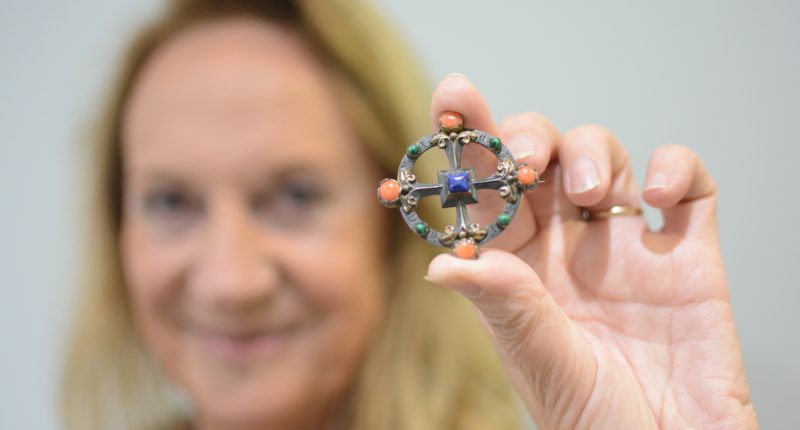A WOMAN bought an old brooch for £20 thinking it was costume jewellery – but realised it was worth a lot more after seeing a TV clip.
Flora Steel purchased the silver brooch in 1988 not realising it was a “historically significant” piece of long-lost jewellery dating back to the 19th century.
She contacted auctioneers after watching the Antiques Roadshow and noticed her design was similar to one featured on the BBC One programme and later sold for £31,000.
Experts confirmed her brooch was an original by the great Victorian Gothic Revival architect William Burges, who designed Cardiff Castle.
And Flora was left gobsmacked after it also emerged it had been made as a bridesmaid’s gift for the wedding of the great-niece of Admiral Lord Nelson.
It will now go under the hammer on March 19 with an estimate of £10,000 to £15,000 at Gildings Auctioneers in Market Harborough, Leicestershire.
Flora, who has collected silver jewellery since she was 13, said she picked up the brooch after it caught her eye at an antiques market 35 years ago.
She added: “I wore the brooch for about five years on the green velvet lapel of a favourite coat.
“When both the coat and brooches went out of fashion, it remained in my London wardrobe for another 20 years until my daughter-in-law found it and started wearing it.
“So, when the TV clip popped up out of the blue last March, I couldn’t believe it. I was absolutely stunned.
Most read in Money
“My speciality lies elsewhere in 18th century and early 19th century art, but as an art historian this was such an exciting thing to discover out of the blue and after so many years.
“So, of course I’m very much looking forward to seeing what happens at the auction.”
Burges is best known for designing Cardiff Castle and Castell Coch in South Wales and his designs remain on display at the Victoria and Albert Museum.
He has also been described as “the greatest genius of 19th-century design”.
At the end of last year, all that was known about the brooch was that it was believed to have been made for the wedding of an individual named Gibson.
Research has since identified this man as a friend of Burges’, the Rev’d John Gibson.
Born in 1815, Gibson became Dean of Jesus College, Cambridge, and as an instrumental figure in the Gothic Revival movement, he played a key role in the restoration of Jesus College Chapel.
In 1857 he was instituted to the Rectory of King’s Stanley, Gloucestershire.
Pros and Cons of selling valuable items at an auction
If you are considering an item through an auction house it may be worth weighing up the pros and cons, as revealed by WeBuyVintage.
You may want to confirm that the item you have actually is worth some serious money and not just to be flogged off at a car boot sale.
This is where a reputable auctioneer may come in handy and will likely offer a free valuation.
A professional appraisal will make sure of an accurate price when it is put up for sale, attracting potential buyers.
By using an auctioneer, they can provide the right platform to attract potential collectors or enthusiasts, while an online ad may simply get lost in the deluge.
An auction creates the environment of competitive bidding, where rival bidders try to out do each other, which can push the sale way over the estimated valuation.
Putting items up for auction can insurance a speedy sale as there is a fixed date of possible sale, whereas it could take ages for an ad to attract a buyer.
The reputation of an auction house may be important as this will proceed them and establish credibility which will attract serious buyers who will respect the opinion of an auction house.
It’s not all plain sailing though and there are some potential drawbacks.
There are fees and commissions involved. While with selling privately, the owner gets to keep every penny but an auction house will charge fees and commissions for their efforts.
The outcome of an auction isn’t certain and the seller doesn’t have control over the final price, which could be less than was expected.
Details of auction items and how much they sold for are often publicly available which may not suit someone who wants to maintain their privacy and discretion.
The item maybe undervalued by an auction house if they lack the expertise in how to market a particular item and don’t have the specialist knowledge.
Sellers should also be aware that there is very likely going to be a deferred payment once their item has been sold. This is often down to a settlement period in place and admin issues.
Annotations on V&A sketches show three silver and three gold brooches were made as bridesmaids’ gifts for Gibson’s 1864 London wedding to Caroline Bendyshe, a great-niece of Admiral Lord Nelson.
The brooch is inscribed ‘JCG’, for John and Caroline Gibson.
Gildings director Will Gilding said: “We’re thrilled and astonished that for an almost unbelievable third time, a chance viewing of Antiques Roadshow has led to a lost Burges brooch finding its way to our saleroom.
“It remains to be seen if this brooch will exceed its estimate in the spectacular manner of the 2011 one.
“However, because of its very special significance as a Burges design, we’re delighted to see it already attracting interest from all over the world, particularly in the USA, where there are many avid collectors of items from the Victorian Gothic era.”
Tobias Kormind, managing director of Mayfair headquartered 77 Diamonds, Europe’s largest online diamond jeweller, told The Sun Online: “This jewel is one to watch.
“Along with its aristocratic links, its creator was widely acknowledged to be the greatest of the Victorian so-called art-architects.
“I expect this brooch will fetch upwards of £20,000.
READ MORE SUN STORIES
“This wouldn’t be the first time a bargain find transforms into a potentially handsome windfall.
“A diamond ring bought for £10 at a 1980s car boot sale was snapped up in 2017 at Sotheby’s for £656,750 after it turned out to be a 19th century treasure.”












